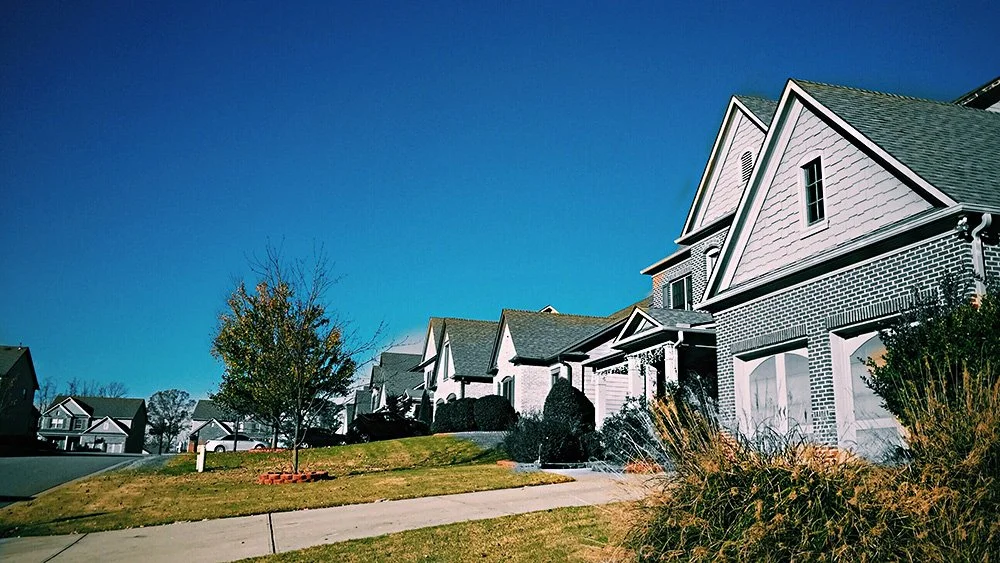Nobody wants to “destroy the suburbs.” But everyone should want to end the Suburban Experiment.
The Suburban Housewives of America must read this article. Biden will destroy your neighborhood and your American Dream. I will preserve it, and make it even better! https://t.co/1NzbR57Oe6
— Donald J. Trump (@realDonaldTrump) July 23, 2020
Things get weird in a presidential election year. The election feels, sometimes, like a black hole in the middle of our shared public life—consuming everything it can, warping and distorting our view of what it can’t.
One of the most recent issues to be drawn into the November event’s horizon is the issue of “abolishing the suburbs.” Last week, President Trump tweeted to the “Suburban Housewives of America” that his presumptive Democratic challenger, Joe Biden, will “destroy your neighborhood and your American Dream.”
And back on July 16, the president said from the South Lawn:
The Democrats in D.C. have been and want to, at a much higher level, abolish our beautiful and successful suburbs by placing far-left Washington bureaucrats in charge of local zoning decisions. They are absolutely determined to eliminate single-family zoning, destroy the value of houses and communities already built, just as they have in Minneapolis and other locations that you read about today. Your home will go down in value and crime rates will rapidly rise.
Joe Biden and his bosses from the radical left want to significantly multiply what they’re doing now. And what will be the end result is you will totally destroy the beautiful suburbs. Suburbia will be no longer as we know it. So they wanted to defund and abolish your police and law enforcement while at the same time destroying our great suburbs.
President Trump giving his remarks on the South Lawn. July 16, 2020. Image via The White House (Flickr).
There are a couple ironies in the role the suburbs are now playing in the political debate.
The first is that even as Republicans (it’s not just the president) warn that Democrats want to “destroy the suburbs,” the Suburban Experiment—an approach to growth that includes, but is certainly not limited to the actual suburbs—is actually destroying the prosperity of the country.
Beginning in the first half of the twentieth-century, U.S. towns and cities expanded rapidly outward rather than reinvesting in traditional neighborhoods. They also pursued short-term “growth” by taking on massive liabilities—in the form of infrastructure that must be maintained or replaced forever. Zoning thwarted these neighborhoods from evolving into a higher state of intensity…and thus inhibited the creation of wealth. So to pay for the old growth, we had to pursue new growth, which we can only pay for through even newer growth. In this way, the suburban development pattern traps communities in a debt spiral. It saddles current and future generations with huge bills that are already coming due. Americans are having a serious national debate about defunding the police, even as more and more debt-strapped cities can’t afford basic services, including public safety.
The second irony is that conservatives should be in favor of ending the suburban development pattern—and perhaps even leading the charge.
Image Credit: Library of America.
I recently started reading the anthology American Conservatism: Reclaiming an Intellectual Tradition. In his introduction, Andrew J. Bacevich laid out six propositions at the center of American conservatism. They are (quoting in full):
a commitment to individual liberty, tempered by the conviction that true freedom entails more than simply an absence of restraint;
a belief in limited government, fiscal responsibility, and the rule of law;
veneration for our cultural inheritance combined with a sense of stewardship for Creation;
a reluctance to discard or tamper with traditional social arrangements;
respect for the market as the generator of wealth combined with a wariness of the market’s corrosive impact on human values;
a deep suspicion of utopian promises, rooted in an appreciation of the recalcitrance of history and humankind’s recurring susceptibility to hubris.
Conservatives who agree with some or all of these propositions should be skeptical of the Suburban Experiment. For one thing, the Suburban Experiment represents a radical departure from the inherited wisdom of how our ancestors built cities. As we’ve written elsewhere, while the American development pattern may seem normal to us, within the context of human history, it is “one of the greatest social, cultural and financial experiments ever attempted.”
The knowledge we apply daily in this experiment wasn’t developed by trial and error over the slow grind of centuries. It was advanced in academia and within government meeting rooms, initially based largely on the theories of European intellectuals.
We didn’t try it out for a couple of generations in one part of the country to see how it would work. We just did it. Everywhere. All at once.
Ending the Suburban Experiment aligns with other core conservative principles too. As Bonnie Kristian, a contributing editor at The Week and a columnist at Christianity Today, recently articulated, “destroying the suburbs”—not by sending in bulldozers to demolish your single-family home (something no one is talking about), but rather by relaxing zoning laws, allowing greater building flexibility, allowing duplexes and granny flats, letting small business districts form, etc.—should appeal to Republicans’ social conservatism, free-marketism, and populism. Kristian writes:
Upzoning — allowing construction of buildings with more units or more nonresidential units than was previously permitted in a given area — seems like it should fit the GOP agenda.
It's a move toward greater economic freedom and stronger property rights. It can lower housing prices and make homeownership more accessible, especially for young couples who struggle to afford both home and kids. (A brief dig through the archives of the conservative Heritage Foundation turns up years of praise for Houston's unusual lack of zoning restrictions on exactly these grounds, and The American Conservative regularly publishes arguments for upzoning, including advocacy for doing away with single-family zoning altogether.) Also, having a granny flat means you might actually live with your granny, who can pass along familial traditions and help with childcare, a very attractive option amid pandemic. Surely this is the kind of pro-family, even pro-natalist policy Republicans ought to like. Why is Trump railing against it?
Image Credit: Jean-Philippe Delberghe on Unsplash
Neither should the suburbs—as they are so often portrayed—be the poster-child of local control. Kristian points out that the suburbs are, in fact, very subsidy-dependent. And, she writes, the original subsidies were “introduced by the archetypal Democratic administration: the New Deal-era White House of Franklin Delano Roosevelt.” Kristian cites a recent article in The American Conservative by Strong Towns founder and president Chuck Marohn, and links to other Strong Towns articles here.
In many respects, our world today seems very different than it did four years ago. But the best approach to rebuilding prosperity and financial resilience hasn’t changed. In fact, these words from Chuck Marohn, written on the eve of Election Day 2016, are as relevant as ever:
I've traveled this country for years now. I've spoken to more people and seen more of the good and bad than just about anyone. What this country needs, what can unite us, is a Strong Towns approach. We will have a strong and prosperous nation only when we have strong cities, towns and neighborhoods. That kind of prosperity cannot be imposed or engineered from the top; it must be built slowly from the ground up. Scale our economy to those working at the ground level and we will see a true prosperity emerge from the fear and acrimony that is our national dialogue.
Things get weird during presidential election seasons, and, unfolding amidst a global pandemic and domestic protests, 2020 promises to be one of the strangest. One welcome twist may be that Democrats and Republicans discover rare common ground: rolling back the disastrous Suburban Experiment.
Cover image via Flickr user Gage Skidmore.







In this episode of Upzoned, co-hosts Abby Newsham and Chuck Marohn talk about satellite communities and the psychological phenomena that incline people toward large projects.